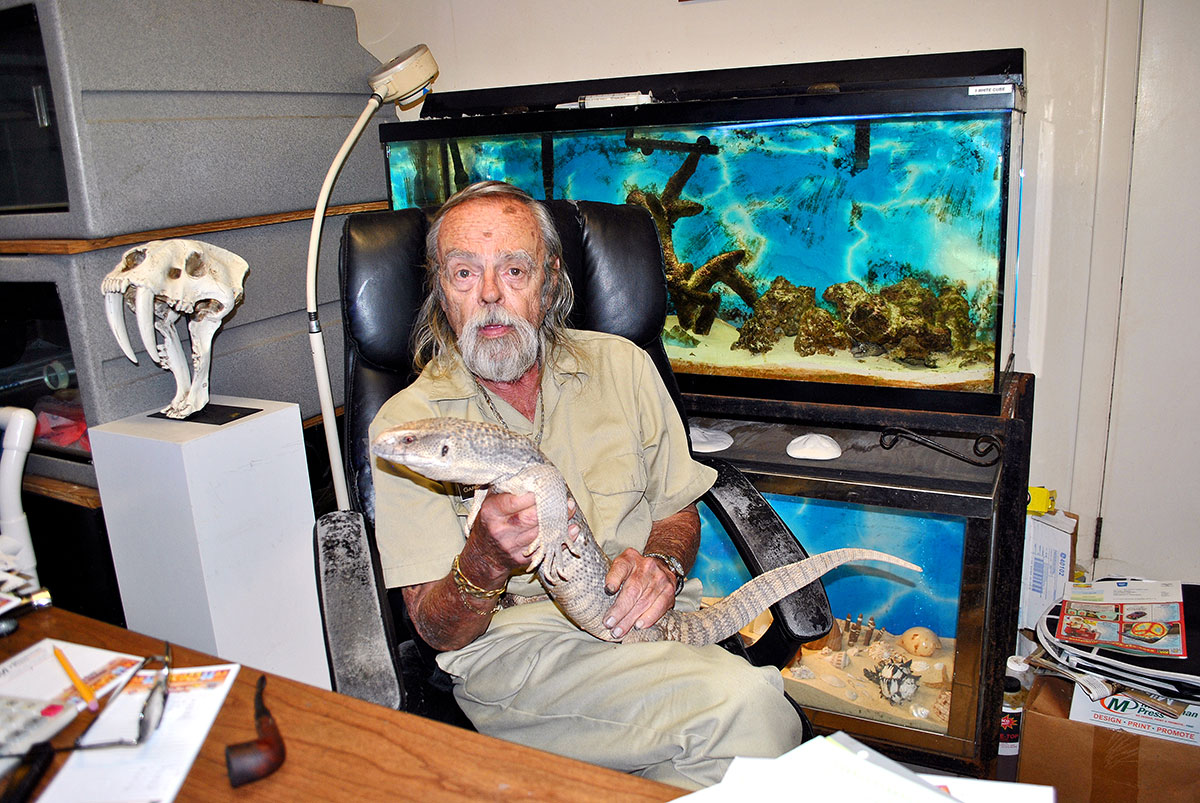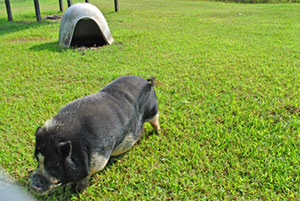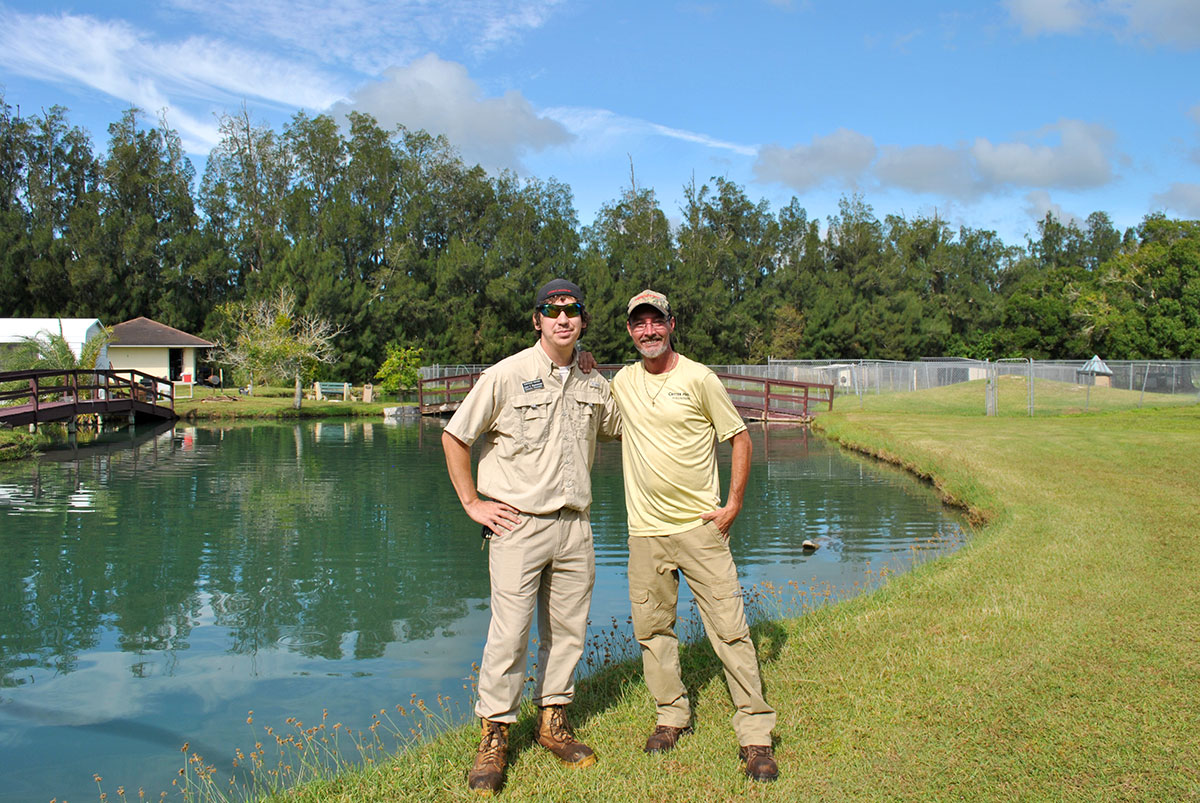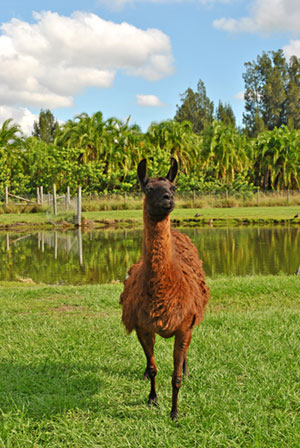The CRITTER RESCUER

BY KERRY FIRTH

Gary Brady’s executive office is a cramped corner of an overflowing herpetarium-aquarium building. He is comfortable seated in his worn leather chair at his desk wedged between massive saltwater aquariums teeming with colorful tropical fish and temperature-controlled herpetariums accommodating exotic reptiles’ special needs for light and heat.
Outside, boas and pythons sun themselves in their cages with tree trunks to climb and burrows to hide in. Just behind Brady’s area is a medical lab where staffers prepare the animals’ specialized food and administer medical attention when necessary. It’s safe to say that Brady is a no-frills, hands-on director who deeply loves all the creatures he rescues and houses at Critter Haven in Vero Beach.
It all started about 20 years ago when Brady’s wife wanted a pet and he bought her a hermit crab so she wouldn’t become too attached. The plan didn’t work very well. Before long, their home was bursting with birds, reptiles and mammals that needed care. They decided to commit themselves to saving abused and unwanted exotic animals and moved to a 10-acre property west of town. He built a beautiful home and devoted the rest of the estate to the animal sanctuary. Using all his own money, he built different buildings designed specifically for the comfort of the species they housed. A 26-year-old lemur lives in a 13-by-13-foot enclosure with a tree trunk and enrichment objects to play on. The aviary building houses small animals like kinkajous, prairie dogs, chinchillas, hedgehogs and small birds. The “free flight” building is a 20-by-35-foot aviary with a 12-foot ceiling giving large birds plenty of room to fly. Nearly 20 stunning, exotic birds including cockatoos, African greys and blue and gold macaws cavort happily in their forever home overlooking a pond and gazebo. Beyond the pond are spacious paddocks housing llamas, emus, goats, a Vietnamese potbelly pig, a mule and a 4-year-old wolf hybrid named Jax. In total there are nearly 200 animals living the good life at Critter Haven.
“This is my life’s work,” says the soft-spoken Brady. “I’ve invested my life savings and my soul into this sanctuary. I’ve reinvented myself several times in my life and now that I’ll be turning 80 soon I’m wondering what I’ll do when I grow up.”
And what a winding and adventurous path he’s taken throughout life. Starting right out of college as an elementary school art teacher in Flint, Michigan, Brady quickly rose through the ranks to become the art administrator for the Flint school system, which entailed moving from school to school and hiring teachers. He then took over as art administrator for a larger school system in Louisville, Kentucky, where he ran art programs for 22 schools. While in Louisville he got his third academic degree and was offered a Ph.D. but decided to walk away from administrative work and move to Quebec to fly hot air balloons. “When I told the dean my plans, he said I was the youngest person to qualify for a Ph.D. at that campus and if I walked out that door I would regret it for the rest of my life.” When asked if he had regrets, Brady responds with a resounding “Naw!”
“My first wife was Canadian so we moved to Quebec and I learned to fly hot air balloons,” he continues. “It really was magical. I flew them all over Canada and the United States and it wasn’t long before I became vice president of a ballooning organization. It always comes back to administration. Even now, I’m back behind a desk.”
Brady eventually moved to Vero Beach, where his mother had a condo, and he quickly found work with the Indian River School District. “They only had four art teachers in the entire district,” Brady explained. “I told them to hire me and I’d build an entire department.” And he did. By the time he retired he had hired 23 art teachers and ensured there was a dedicated art room in every school.
Tragedy struck in May 2015 when an electrical fire destroyed his home and all its contents. “It was a devastating loss,” laments Brady. “I lost my extensive art collection, my classic car collection, my first edition books of poetry and artifacts that I had collected from around the world.”


Fortunately, the fire was contained to the main structure and all of the animals in the sanctuary were safe. “Since there was no electricity we had to keep the fish tanks and reptile aquariums operating with generators,” he says. “It was a very dark time. But, life goes on.”
Brady never rebuilt the house. His second wife, Beverly, who shared his vision and love of exotic rescues, had passed away by the time of the fire, and he didn’t see any reason to reconstruct the home for himself. Instead, he put what little insurance money he received into the sanctuary.
“We’re running out of money, and I’m afraid that we may not be able to sustain Critter Haven for another year,” he says with tears in his eyes. “Most of the animals here are old and it’s kind of like a retirement home for exotics. We don’t adopt out, or sell, or re-home any of them. We keep them for the rest of their lives. Buckwheat, the lemur, has been here for 20 years. I’m afraid that if we can’t sustain it, all of these critters will be quietly put to sleep. That would kill me. They’d have to euthanize me first.”
Fortunately, there are others who share Brady’s passion so there is hope for Critter Haven. The staff of eight who have volunteered their time, simply for the love of animals, are committed to keeping the sanctuary alive. General manager Joey Borneman started volunteering at Critter Haven when he was only 17. He and assistant manager Brian Walzak have both worked at the sanctuary for 12 years and are the heirs apparent.
“We love this place and we are committed to keeping it operational,” says Borneman. “We are looking into various types of fundraising opportunities to help us fund the food, medicine and maintenance of the refuge. We are undergoing a massive reconstruction and hopefully someday we’ll be able to offer tours.”
“These animals are like our family,” explains Walzak. “It took me nearly a year to gain the trust of Jax, our hybrid wolf. He was surrendered by a family who couldn’t take care of him because he is more like a wild wolf than a dog. People buy these exotic animals thinking they’ll make good house pets and they don’t. That’s when they either surrender them or law enforcement steps in, confiscates them and brings them out here.” Walzak goes on to tell how a kinkajou was found in a kitchen cabinet during a drug bust and a cockatoo was surrendered by her owner when she got cancer. “I worked at a pet store and sold her the cockatoo. When she got sick and could no longer care for him she brought him out here. Now he’s back to loving on me.” He beams as he kisses the bird perched on his shoulder.
Brady estimates that this year the maintenance costs and improvements to Critter Haven will exceed a quarter of a million dollars. Food alone costs nearly $3,000 a month. Local community partners have stepped up to keep the sanctuary open. Publix donates food and produce and several local vets donate their services. The public is invited to help by becoming a member of Critter Haven or making a donation. Critter Haven is a 501(c)(3) nonprofit organization so contributions are tax-deductible. For more information, visit www.critterhavenverobeach.org.
More than anything, Brady just wants his beloved exotic animals to live out the rest of their lives in comfort. “I’ve opened it up to my staff and I’ve told them that when I die, I want my epitaph to read: I’m gone, but Critter Haven lives on.”
GARY BRADY
Age: Almost 80
Lives in: Vero Beach
Family: Son, Jason Brady
Occupation: Executive director of Critter Haven
Education: Bachelor of Arts and Master of Arts in arts education, Michigan State University; Master of Science in administration, University of Louisville
Who or what inspires me: “My staff and the animals.”
Something people don’t know about me: “My history and path has taken me around the world, but what’s important right now is the animals.”
